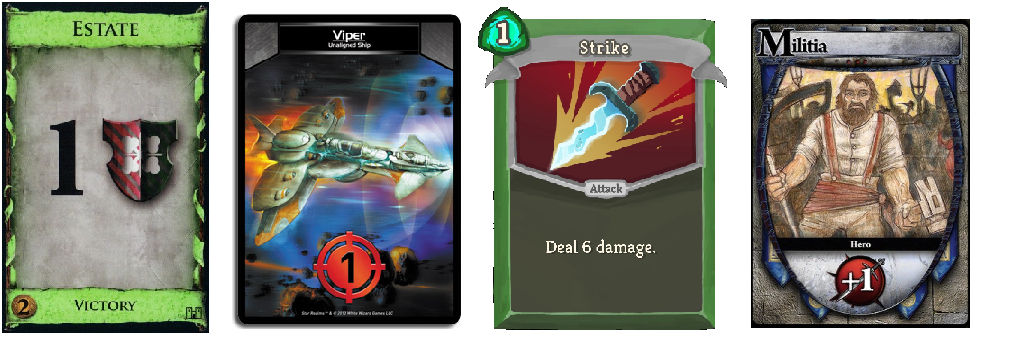I'm testing a format for guides where I write something for beginners, and a + section for gritty details.
Whether you're getting into Slay the Spire, Monster Hunt, Dominion, Star Realms, Hero Realms, To Arms!!, Ascension, Legendary, or any other deckbuilder, I've got some sweet tips for you.
Some of these tips might help reframe your approach even if you're already good.
Tip #1: Never forget how terrible your starting deck is
wow thanks!
All of your deckbuilding decisions rely on the fact that your starting deck is absolute garbage. Which makes sense. The appeal of deckbuilders is about seeing improvement over time, so an awful starting point makes buying cards feel way more rewarding.
After playing even a single game it gets pretty obvious that your starting deck is awful - so the big skill curve in deckbuilders is figuring out what you can actually do about that.
One approach to deckbuilding is to acquire tons of cards and make a "thick" deck. A deck with lots of decent cards dilutes the frequency of drawing bad cards. This approach works well if your game has a "curse" or "junk" mechanic that gives you useless cards. Most deckbuilders make it hard to remove cards from your deck, so while mathematically it's better to remove the bad cards outright, games tend to balance this by making it easier to dilute cards than remove them.
The downside of making a thick deck is that variance prevents you from always grabbing the best cards possible. As such, you'll often have to 'settle' for decent cards. The result is that while your deck will be consistent, the ceiling is lower since you're actually diluting any 10-star cards you find with all the 7-star cards you picked along the way. (ie 10-star cards being amazing cards, 7-star being decent cards).
The opposite approach to deckbuilding is to remove as many poor cards from your deck as possible through scrap/exile/banish/sell/remove mechanics. Removing cards from your deck is ridiculously powerful because if you have even one good card, you could be drawing it every few turns once your deck is refined enough. It also means you'll draw specific card combos more often!
However, this strategy is vulnerable to curse/junk effects, because you'll ALSO draw dead cards more often if your overall deck is smaller.
Most beginner deckbuilders mess up their deck construction in one of two ways:
1) they feel obligated to spend their money whenever they can, and end up with a bunch of unnecessary mediocre cards. They forget that it's often fine to just pass the turn without buying anything.
2) they don't want to buy any cards outside of their "plan" and pass opportunities to get cards so much that their deck barely grows at all.
Just remember that it's fine to get something imperfect now in order to let yourself snowball a bit later on, even if that first card won't be useful later on.
TL;DR for a beginner, all you need to know is: cards that remove other cards from your deck are awesome. Don't underestimate them.
There's some nuance as to how awesome they are, though, and don't be scared of going big instead.
I really recommend trying out mechanics that remove cards from your deck if you haven't yet, at least to appreciate how consistent your draws can become.
+: Recalculate average deck quality
Your deck quality is self-explanatory, but if you're having trouble analysing it, a good way to envision it is to think about the mean average hand that you'll draw on any given turn. For example, how much money/attack/defense/etc does the average hand draw give you?
Or: when you're not drawing your OP two-card combo, what are you doing with your other turns? How can you make your combo more consistent, or can you have some secondary synergies if the cards don't line up?
Here's some things to think about when it's time to buy/choose a card:
How well does this card synergize with the others in my deck?
Sometimes one card makes a ridiculous combo with exactly one other card. But are you happy to draw it with the majority of possible hands? Is it a useful card even if you draw it alone? Or, is it SO GOOD when it works that it's worth fizzling out a few times first?
Is adding this card worth delaying the time to draw (another powerful card I have)?
Taking 5 cards makes you take an average(ish) 1 turn longer to draw any other card in your deck. If you have one 10-star card in your deck, is taking this 7-star card worth reducing the likelihood of drawing your 10?
This effect isn't very pronounced with just one card, but it does add up.
Am I wasting the opportunity cost of an acquisition by spending my turn getting this card instead of another card?
You see this the most with a card that's free to cast/play and says "gain 1 (attack/money/defend). Draw a card." Any card that you can play for free, that draws you a card + gives a minor bonus seems awesome ("it replaces itself!") but... instead of spending money on acquiring this "free play" card, you could have spent that money on a more impactful card instead - meaning you potentially "wasted" a turn on acquiring a low-impact card. Yes, the card itself is fine, but how many of your resources do you need to sacrifice to acquire it?
*spends 5 minutes drawing and playing entire deck*
"looks like i have uhhh 4 attack and 3 buy power"
That's all for today's lesson on playing deckbuilders. See you later and good luck!
:)



